On not giving a fuck about the apocalypse
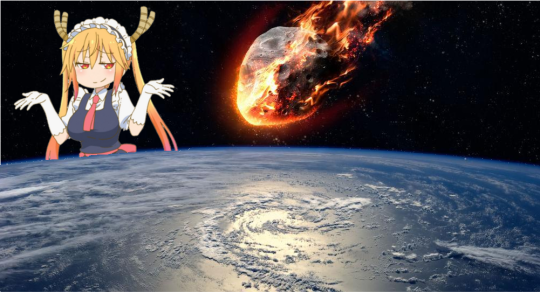 A man sits in his room, no friends, no job, no contact to the outside world and about to run out of money. In a universe completely unrelated to his, containing much more heroism, zany hijinks and badassery, the world is ending. Allow me to present the case that the former scenario has far more gravitas.
Anime has a tendency to present weirdly low stakes when compared to western works of fiction. There are, of course, counter examples, but the trope of the bad ending being the literal end of the world, or something similarly gigantean in scope is certainly a lot less prevalent than in other media. I could effortlessly list ten times the amount of blockbusters about things of that nature, while having seen at least ten times fewer. Why would anyone deprive themselves of this amount of escalation, that is so insane, even just in concept, that it would be a surefire way to keep the audience engaged? The answer lies in the essential distinction between scale and impact.
Let′s look at a series that very consciously doesn′t threaten the apocalypse: Neon Genesis Evangelion.
A man sits in his room, no friends, no job, no contact to the outside world and about to run out of money. In a universe completely unrelated to his, containing much more heroism, zany hijinks and badassery, the world is ending. Allow me to present the case that the former scenario has far more gravitas.
Anime has a tendency to present weirdly low stakes when compared to western works of fiction. There are, of course, counter examples, but the trope of the bad ending being the literal end of the world, or something similarly gigantean in scope is certainly a lot less prevalent than in other media. I could effortlessly list ten times the amount of blockbusters about things of that nature, while having seen at least ten times fewer. Why would anyone deprive themselves of this amount of escalation, that is so insane, even just in concept, that it would be a surefire way to keep the audience engaged? The answer lies in the essential distinction between scale and impact.
Let′s look at a series that very consciously doesn′t threaten the apocalypse: Neon Genesis Evangelion.
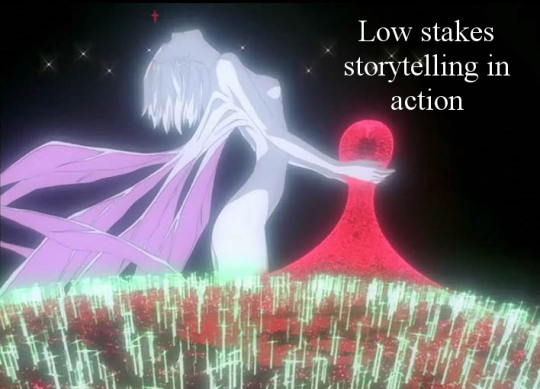 The ″Human Instrumentality Project″ guarantees the continued existence of humanity. Sure, some people would claim that from an ethics standpoint it isn′t ideal, but neither is having your city attacked by giant aliens on a regular basis, so all in all things won′t get much worse than status quo.
Except they will, because humanity doesn′t matter. Not even the characters fight to preserve it. They do what they do because of societal pressure, a need to prove to themselves that they are worth something or to please the person they′re in love with. In short: actual, relatable reasons that a human being would have, rather than some altruistic drive to protect the planet and life in general, that is completely uninteresting due to how unfathomable it is to the average person. If this were relatable to you, you wouldn′t spend your time reading this, or watching anime for that matter, you′d be in the third world helping strangers, because humanity at large is in danger right now.
It′s only natural to be interested exclusively in the wellbeing of oneself and the people one cares about, which includes, for a good piece of fiction at least, the characters in it. Therefore the worst any catastrophe could do is to destroy the chance for these characters to achieve their goals and in a way that is far less dramatic and heart wrenching than regular old non-death failure due to the lack of post defeat suffering no less. Asuka lying catatonically in her bathtub is viscerally painful, just being killed by angles wouldn′t even come close.
The ″Human Instrumentality Project″ guarantees the continued existence of humanity. Sure, some people would claim that from an ethics standpoint it isn′t ideal, but neither is having your city attacked by giant aliens on a regular basis, so all in all things won′t get much worse than status quo.
Except they will, because humanity doesn′t matter. Not even the characters fight to preserve it. They do what they do because of societal pressure, a need to prove to themselves that they are worth something or to please the person they′re in love with. In short: actual, relatable reasons that a human being would have, rather than some altruistic drive to protect the planet and life in general, that is completely uninteresting due to how unfathomable it is to the average person. If this were relatable to you, you wouldn′t spend your time reading this, or watching anime for that matter, you′d be in the third world helping strangers, because humanity at large is in danger right now.
It′s only natural to be interested exclusively in the wellbeing of oneself and the people one cares about, which includes, for a good piece of fiction at least, the characters in it. Therefore the worst any catastrophe could do is to destroy the chance for these characters to achieve their goals and in a way that is far less dramatic and heart wrenching than regular old non-death failure due to the lack of post defeat suffering no less. Asuka lying catatonically in her bathtub is viscerally painful, just being killed by angles wouldn′t even come close.
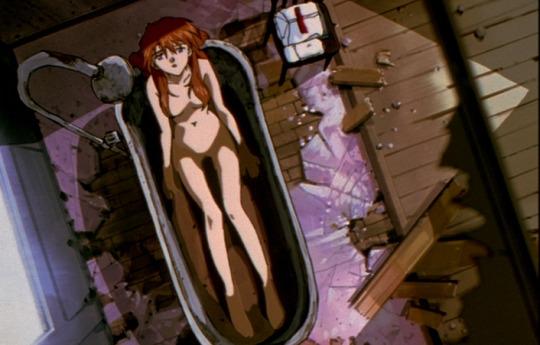 Having a character witness the death of a loved one in an apocalypse style setting might be similarly tragic, if their agony weren′t immediately cut short by the whole everyone dying thing. So what′s the point? If apocalypses aren′t as big a deals as basically anything else, why are they used at all?
The short answer is that they′re flashy, a trailer with a metropolis engulfed in flame would certainly fare much better than one with two people talking on a bench interspersed with the occasional close up on feet (except for some people, I guess). But that doesn′t hold true for anime, as the latter can be just as visually impressive and eye catching as any citywide inferno if the right people animate it.
Having a character witness the death of a loved one in an apocalypse style setting might be similarly tragic, if their agony weren′t immediately cut short by the whole everyone dying thing. So what′s the point? If apocalypses aren′t as big a deals as basically anything else, why are they used at all?
The short answer is that they′re flashy, a trailer with a metropolis engulfed in flame would certainly fare much better than one with two people talking on a bench interspersed with the occasional close up on feet (except for some people, I guess). But that doesn′t hold true for anime, as the latter can be just as visually impressive and eye catching as any citywide inferno if the right people animate it.
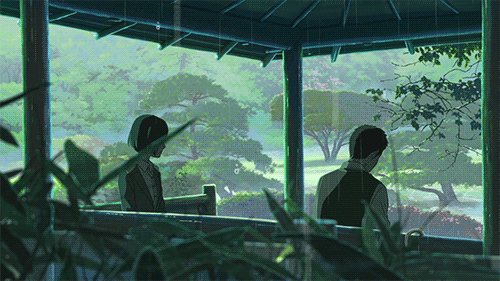 That′s not the only reason why the medium, in which a narrative is presented, matters though. How much the world behind the screen resembles reality can be made out as the second key factor. Thoughts of: ″What would happen if this was me, what if my life, my loved ones were at risk″ are much more likely to occur and much more troubling the less abstracted the format, in which the story is conveyed, seems. How could things in this cartoon universe possibly happen in our reality? Suspension of disbelief is a powerful thing after all.
All of this leaves anime and animated media in general in a unique predicament, at once forced to create actual, relatable characters and conflicts to make the audience care, but also able to imbue anything, mundane, insubstantial or ephemeral as it may seem with a cool, stunningly beautiful or just straight up weird aesthetic, that will catch people′s eyes, allowing creators to tell any story they see as interesting. Which brings us back to our NEET, rotting away in his room, trying desperately to become a human being again. He wrote a novel about someone in just that situation, filled to the brim with genuine pathos. The novel got an anime adaptation, and people like me won′t shut up about it, because scale is irrelevant, humanity is irrelevant and individual experiences matter.
That′s not the only reason why the medium, in which a narrative is presented, matters though. How much the world behind the screen resembles reality can be made out as the second key factor. Thoughts of: ″What would happen if this was me, what if my life, my loved ones were at risk″ are much more likely to occur and much more troubling the less abstracted the format, in which the story is conveyed, seems. How could things in this cartoon universe possibly happen in our reality? Suspension of disbelief is a powerful thing after all.
All of this leaves anime and animated media in general in a unique predicament, at once forced to create actual, relatable characters and conflicts to make the audience care, but also able to imbue anything, mundane, insubstantial or ephemeral as it may seem with a cool, stunningly beautiful or just straight up weird aesthetic, that will catch people′s eyes, allowing creators to tell any story they see as interesting. Which brings us back to our NEET, rotting away in his room, trying desperately to become a human being again. He wrote a novel about someone in just that situation, filled to the brim with genuine pathos. The novel got an anime adaptation, and people like me won′t shut up about it, because scale is irrelevant, humanity is irrelevant and individual experiences matter.
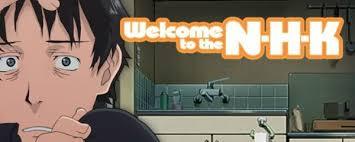 TL;DR: high stakes are boring, just dealing with the human condition can be incredibly captivating, watch ″Welcome to the NHK″ and ″Garden of Words″ (also NGE, I guess).
TL;DR: high stakes are boring, just dealing with the human condition can be incredibly captivating, watch ″Welcome to the NHK″ and ″Garden of Words″ (also NGE, I guess).
<= Go back